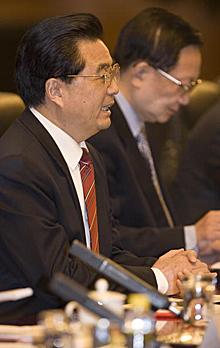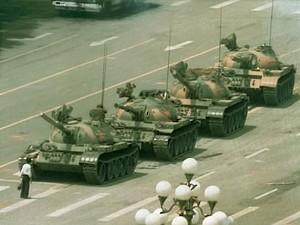The Sixth Plenary Session of the Sixteenth Central Committee of the Chinese Communist Party (CCP) ended on October 11. This year’s meetings centered on the objective of “building a harmonious society.” The opinions expressed and proposals submitted reflected pessimism and disappointments of the delegates in attendance. Representatives at the meeting listed a total of 579 issues and internal problems that currently hinder their objective.
Abolish The Custom Of Watching Entertainment Programs
The Sixth Plenary Session lasted one-half days longer than any such prior assemblies. In addition to lengthening the number of daily sessions, discussion sessions were also held during the evenings of October 8-10. Evening entertainment programs for the delegates were cancelled due to the large workload.
A resolution on constructing a socialist harmonious society was passed in a pessimistic atmosphere just before the Sixth Plenary Session concluded on October 11.
Over 500 Issues Were Raised
Nine groups and geographic areas were represented at the Sixth Plenary Session. Delegates representing North China, Northeast China, Northwest China, Southwest China, East China, South China, the People’s Liberation Army, the Central Committee of the CCP and State Council Ministries and Commissions, and the Commission for Discipline Inspection were included. In addition, a separate delegate unit designated as Specially Invited Representatives were in attendance.
The delegates focused on the objective of “building a harmonious society.” A total of 579 issues and internal problems that currently hinder the attainment of this objective were raised and summarized by the delegates. Some of the larger groups co-signed a total of 47 proposals for the congress to consider.
‘Resistance Rises To The Level Of Demanding Changes In Political Power
Many representatives were pessimistic during discussions surrounding “new” ideas for resolving China’s internal problems. Several delegates were ready to fight when discussions grew heated. The following lists some of the discussion points:
- After 20 years of economic reforms the economy has moved forward. During this same 20 years, the foundation on which to build a stable social system and society has essentially disintegrated.
- The CCP claims as its foundation the worker and peasant classes. In reality, the worker and peasant classes are at the bottom of Chinese society. They bear the heaviest burden with respect to earning a living and have gained the least from recent economic reforms. The tendency toward dissent from these two classes is quite obvious.
- The Chinese version of a socialist society has failed.
- A capitalist style privileged class has established itself at the top of the new economic system of China. This new upper class controls the government and makes the decisions that determine China’s future direction. This increasing dichotomy between rich and poor has caused conflicts among social classes and turbulence in society as a whole.
- Worker and peasant classes are demanding a change in political leadership as resistance against the new social order increases.
- Cadres of the CCP have betrayed the social basis for their rule, the original objectives of CCP rule, the ideology of CCP membership, and their own responsibilities and missions.
- The CCP is at a critical turning point with respect to future directions.
The Eight Major Conflicts in the Society Are Worsening Day By Day
The congress identified eight major social conflicts that continue to worsen with time. These conflicts are: 1) between the central committee and the local CCP and government; 2) between the authority of the local CCP and government and that of the ministries and commissions; 3) between urban and rural development; 4) between the interests of the local area and that of the local CCP and government; 5) between the interests for the local CCP, government and state departments and that of the people; 6) between the people with urban household registration and the floating population; 7) between the interests of state-owned enterprise and that of private enterprise; and 8) between higher social classes and the workers and peasant class.
Hu: We are facing the choice between prosperity and destruction
Hu Jintao, Wen Jiabao, Wu Bangguo and Wu Guanzheng all gave speeches at the congress.
Hu Jintao gave a speech entitled “Constructing a harmonious society is the CCP’s sense of mission”. In his 40-minute speech, Hu sometimes appeared to be sad and sometimes appeared to be elated. He said that constructing a harmonious society is a severe historical test and challenge that determines whether the CCP’s status as the ruling party can be consolidated, whether the CCP’s rule represents the will of the people, and whether the CCP’s rule can pass the test of time.
Hu also said that the CCP is materialistic. It must face the current difficulties head-on. We are facing a choice between prosperity and destruction. Hu also appealed for people not to be pessimistic or depressed and definitely do not give up when faced with difficulties.
Hu’s appeal for unity was not without merit. The atmosphere inside the congress had been grim.
Discussion Documents Distributed in the Congress
The discussion documents distributed during the Sixth Plenary Session included: 1) “The Condition of Unstable Factors and Hidden Dangers for Current Politics And Society”; 2) “Report on the Expansion And Worsening of Various Oppositions, and Rights Defending Activities in the Society”; 3) “Investigation on the Chaotic Condition of the Thought Construction and Organization Construction Inside the Party”; 4) “The Deteriorating Condition of Social Morality, Atmosphere and Order”; 5) “Report on Financial and Economic Hidden Dangers and Crisis”; and, 6) “About More Strictly Restrain and Educate Spouses’ and Relatives’ Behaviors and Activities.”
The title of these documents alone provide insight into the current situation in China: 1) China under the rule of the CCP is not a harmonious society, and 2) The CCP is now vigorously lobbying public opinion and actions toward the resolution of current issues and internal problems and the “construction of a harmonious society.”


